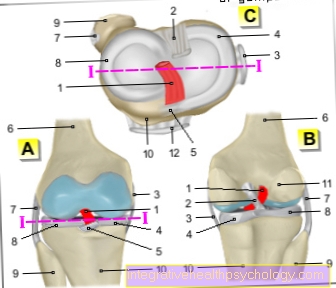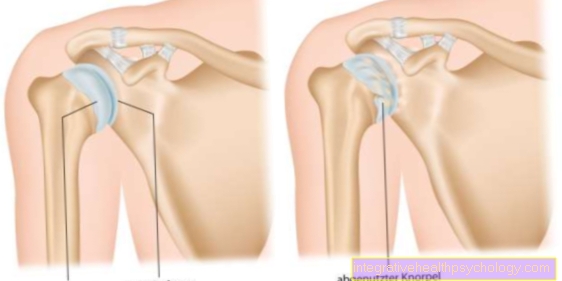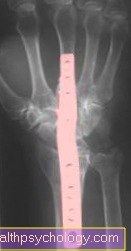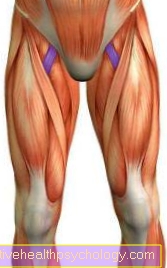Endurance sports and nutrition
introduction
Many people in Germany do endurance sports to keep fit and to find a balance to everyday life.
Most of the athletes train for a marathon or other long-distance sporting event and, in addition to the training plan, also pay attention to a suitable diet in order to achieve the best possible performance during competition. A diet tailored to an endurance sport can have some performance-optimizing aspects. This includes covering the high energy requirements during endurance performance, the high-carbohydrate diet that is heavily needed in endurance sports, covering the athlete's increased water and electrolyte requirements and increased vitamin intake.
Energy requirements for various endurance sports
In the case of heavy physical work, the required is Amount of energy often at over 3500 kcal (kilos of calories) per day. And even in endurance sports, these values are sometimes far exceeded. At a 90 minute Ice hockey training session nowadays approx. 5000 kcal calculated. At Endurance sports you are clearly above this here. Of the Wasa run, a cross-country skiing over 85 km, with approx. 8800 kcal figured. In the Tour de France an average mountain stage with approx. 9000 kcal counted and a 24 hours Bike races over 700 km is almost 20000 kcal named.
The energy required for this is mainly provided from liquid food concentrates and the human energy reserves from the fat pads. In ten kilograms of human fat slumber approx. 70000 kcal of energy reserves, which serve as the main energy supplier in the event of long-term loads.
Such long endurance loads are hard work for the body and it is not uncommon for competitions such as the ultramarathon to destroy red blood cells and muscle cells. The theory provides energy demand values that can be used for orientation. When doing endurance exercise per kg of body weight 75 kcal calculated.
The food composition recommended for this is 60 percent carbohydrates, 25 percent protein and 15 percent fats. These values can serve as a rough guide, but they can also fluctuate greatly depending on the length of the endurance exercise.
Required high-carbohydrate diet
An important aspect of endurance exercise is one high-carbohydrate diet. A high one Glycogen content in the Musculature extends the working time and also needs enough carbohydrates to replenish and supply the memory again and again.
Typical endurance sports, at them carbohydrates the Basic food form, are Cross-country skiing, Long distance running, Cycling race and swim. But also Team sports how Soccer, Handball or hockey require a high level of carbohydrates.
Especially before endurance sports, it is advisable to eat high-carbohydrate food, otherwise in competition "Lack of fitness" may occur. This is because the body Not very much Glucoseobtained from carbohydrates to save can (450g). It also performs a quick Decrease in glucose concentration in the blood, due to endurance exercise Signs of fatigue, which then significantly reduce performance.
Above all is that Blood sugar level an important indicator of performance. A measure of how quickly or slowly blood sugar levels rise or fall is the glycemic index. Carbohydrate-rich foods quickly become in when consumed sugar converted and into blood convicted. The faster this process takes place, the higher the glycemic index of the respective food (and vice versa). Glucose is assigned the glycemic index 100 as a reference value in order to be able to compare better.
Especially at the end of endurance exercise and immediately after a long exercise, it is important to Foods with a high glycemic index to take in. White bread, sugary drinks, honey and potatoes have e.g. In contrast, apples, yogurt and milk have a high value on them, and have a low glycemic index. The 60 percent recommended for endurance athletes carbohydrates in food per day mean a carbohydrate intake of up to 800 g.
The advantages of high carbohydrate content are a increased endurance performance due to the high level of energy provided by glycogen in the muscle cell, up to ten percent larger Energy yield per liter of oxygen to fats and proteins and one low digestive performancebecause carbohydrates are easy to digest.
However, a high carbohydrate diet has it too disadvantage. Athletes with high carbohydrate content in their diet tend to get too quickly diarrhea due to the increased fermentation in the intestines. In addition, a high-carbohydrate diet is beneficial high food volume with itself, as these foods often have a high proportion water and cellulose have. To avoid these problems, the athletes usually get a nutrient concentrate in liquid form with a high carbohydrate content.
Further information can be found under our topic: carbohydrates
Fats
When it comes to endurance performance you should rely on one high-fat diet better dispense, or their share in a maximum of 25 percent hold. The energy yield per liter of oxygen is very low, which means that the cost of generating the energy is quite high. Besides, the digestion of fats tedious and the Endurance performance total is decreased. Fats are only used increasingly when the energy requirement exceeds 5000 kcal. With such an enormous energy requirement, the amount of food would simply become too large if one were to forego fats. Especially Oils With poly-saturated fat and milk are excellent sources of fat. In particular, the fat content of the milk can be Gut quickly dismantled so that the fatty acids pass through the intestinal wall quickly absorbed become.
Protein intake
In the Protein intake an endurance athlete usually has to not so consistent thereon respect, think highly ofwhat and how much food he eats. As the total amount of food is increased, so is that Increased protein content in food and it should so no problems with a supply occur. The need for protein is more than met, especially when it comes to egg, milk and meat in the total food supply.
Vitamins
At Vitamins it behaves similarly to the Proteins. The opinion has prevailed that the increased need for food also ensures increased vitamin intake and that this is sufficient for endurance athletes. A prerequisite for this is, however whole food, without any waiver. The Vitamins A, E., K and D. are definitely well covered by the food. With the vitamins of the so-called B group, especially the vitamins B1 and B2, which ensure an effective breakdown of carbohydrates, there may be a slight deficiency. In this case it should be with external vitamin intake to be worked. Many athletes take it additional vitamin supplements and hope for a performance enhancing effect. Usually this does not occur. An increase in performance after taking vitamin supplements is usually due to a previous deficiency. Only at high intake levels of vitamin A. and D. can it to abnormal phenomena come.
iron
iron is an important mineral for endurance athletes that is always sufficient in food and in the body should be present. Only five to ten percent of the amount of iron supplied is absorbed by the intestinal wall. Especially with endurance athletes, one often occurs Iron deficiency anemia on. This worsened endurance performance that came with fatigue and Slackness can go along with one Hemoglobin deficiency as a result of a Iron deficiency are based.
Loss of water, nutrients and electrolytes
With long endurance exertion like one Sweat marathon the athletes at one temperature below 20 ° Celsius two to four litersto draw the heat generated by muscle work out of the body. So the body loses a lot water and so too Electrolytes and nutrient. If these considerable losses of water and nutrients are not replenished, the athlete's performance will drop directly. Water losses of two to five percent of body weight slow the heartbeat and to reduce Consequently the total duration overthat can be achieved through endurance. Water and electrolyte losses during the competition must therefore always monitored and be filled. Water is very important to the body as it is one transport, Solution- and Thermoregulation function holds and with it irreplaceable is.
General dietary rules
Many athletes split up their three larger meals four to eight small mealsin order to manage their food quota and to get the training under one roof. In front one competition or one long training session digestion should already be completed. That means one Meal just before exercise is to exclude. If the digestive processes take up too much of the body's energy capacity during a competition, the level of performance can be reduced. The last food intake before a training or a competition should not be too lush and approx. two to three hours before exercise have taken place. Before endurance exercise, you should eat the appropriate meal adequate carbohydrates included so that the Glycogen stores are fully filled in front of the unit. Smaller drinks can also less than two hours be taken before exercise, as they hardly put a strain on the stomach.
During the competition, it is especially important during endurance exercise over ten kilometers necessary enough liquid feed. One should however make sure that the liquid a maximum of five percent sugar contains. It should also not be drunk a lot at once, but about 200 milliliters every 15-20 minutes. In this way, the fatigue limit can be pushed backwards in the event of continuous stress.
Also after the competition you can go through the right one nutrition contribute, to regenerate optimally and to prepare for the next competition. Especially after long-term exercise, you are not immediately hungry. It is highly recommended, however, directly after the sport Carbohydrate and liquid rich food to take in. The sugar becomes the stomach taught quickly and blood sugar levels rise again quickly. If the carbohydrate stores are completely empty, it can take up to 24 hours until they are completely refilled. The athlete should consume 50-75 grams of carbohydrates every two hours. Approximately five to seven percent of the storage capacity is replenished every hour, which means that it can take up to a day for the body to fully refill the storage capacity.
Through the correct food choices you can already optimize your performance significantly. In the case of endurance exercise, you can stick to relatively simple recommendations and thus achieve good results and progress. But it is not just the type of food that is decisive. In addition, the percentage composition of central importance in order to be prepared for a long continuous load.
The logistic division of the times of food intake is also an aspect that should not be underestimated. Anyone who skips a meal or drink before or during endurance exercise must expect to end up starving and, in the worst case, have to abandon the competition. Because without sufficient liquid and food is the body in its Efficiency severely reduced and tired at some point completely.
But above all, you should Drink Just as little forget as the diet. Even with too little fluid in the body, the performance is greatly reduced.





























-de-quervain.jpg)